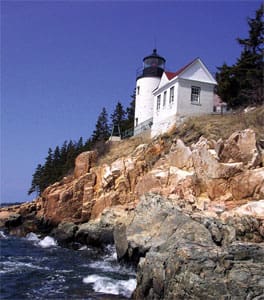The iconic Maine lighthouse foghorn will no longer be activated by fog when new equipment is installed this year. The U.S. Coast Guard will be converting the current VM-100 fog-activated signals to a new system that is remotely activated by mariners via VHF radio. The new system, called Marine Radio Activation Sound System (MRASS), is activated by tuning to VHF marine radio channel 83 Alpha and clicking the transmit button five times. All foghorns in the area will then be activated for a period of 45 minutes before re-activation is necessary.
The conversion of the signals started in Maine and New Hampshire in 2009 following an announcement by USCG Sector Northern New England. Seven lighthouse foghorns were converted, but the program was temporarily put on hold while some area residents protested the change. Maine conversions include Wood Island Light in Biddeford, Ram Island Ledge Light near Cape Elizabeth, Cuckolds Light near Boothbay, Pond Island Light near Phippsburg, and Moose Peak Light near Jonesport. Goat Island Light near Kennebunk was converted but the old system was re-installed following protests from nearby residents. The Coast Guard plans to delay converting the rest of the foghorns until the end of 2015 to allow for more public comment.
The Coast Guard says that the conversion is necessary because the company that manufactured the old VM-100 system that was installed in the 1980s has gone out of business and that spare parts are difficult to obtain. It also cited the expense of maintenance and the personnel requirements for service calls.
The conversion from the old VM-100 system to the MRASS has been completed in the Great Lakes shipping lanes and has been operating without incident.

